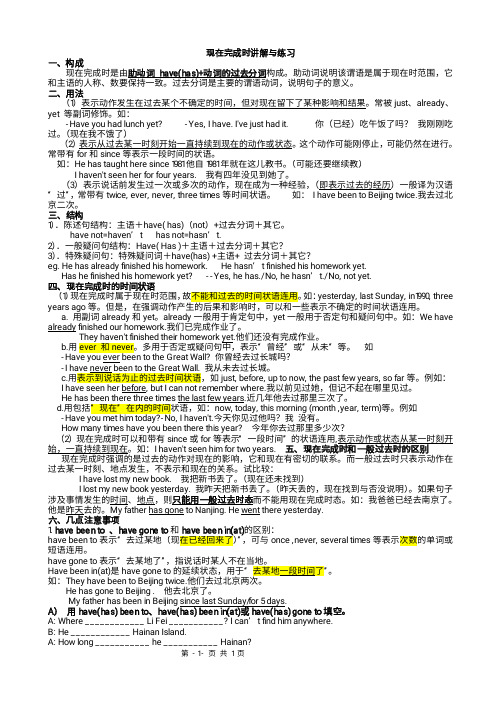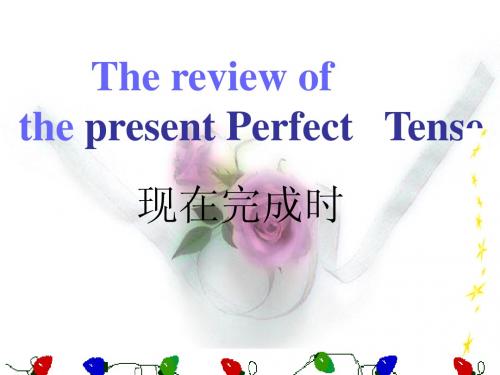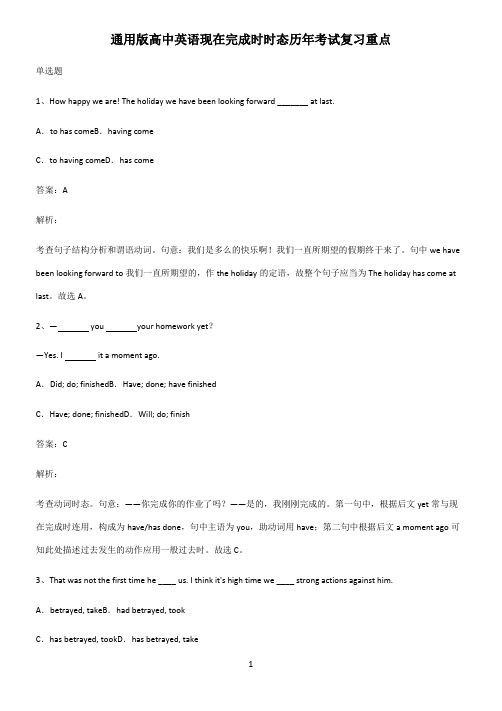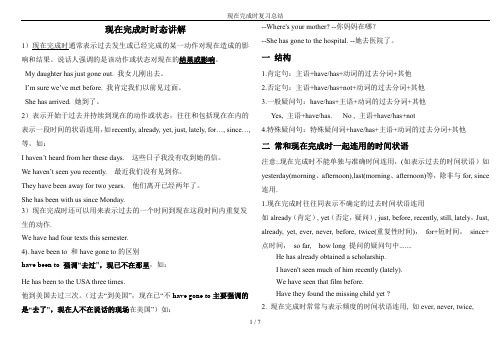现在完成时复习
复习复习现在完成时

动词过去分词 的规则变化规律
双写+ed
注:以一个辅音字母结尾 的重读闭音节词,双写最
后一个辅音字母+ed
study studied studied
carry carried carried
变y为i,+ed
try tried tried
注:以辅音字母+y结尾, 变y为i,+ed.
play played played enjoy enjoyed enjoyed stay stayed stayed
ABA型
(原形与过去 分词相同)
take go do see is/am
/are
took taken
went gone
did
done
saw seen
was been
/were
ABC型 (三种都不一样)
the West Lake
the Great Wall
A: I have been to the West Lake.
直接+ed
注:以元音字母+y结尾, 直接+ed.
写出下列动词的过去式和过去分词:
原形 过去式 过去分词 shut shut shut
动词过去分词 的不规则变化
cut cut cost cost
cut cost
AAA型 (三种都一样)
put put
put
make have keep find buy
Have you ever loved somebody So much it makes you cry Have you ever needed something so bad You can't sleep at night Have you ever tried to find the words But they don't come out right Have you ever Have you ever Have you ever been in love Been in love so bad You'd do anything To make them understand Have you ever had someone Steal your heart away You'd give anything To make them feel the same
中考英语复习:现在完成时讲解与练习

现在完成时讲解与练习一、构成现在完成时是由助动词h a v e(h a s)+动词的过去分词构成。
助动词说明该谓语是属于现在时范围,它和主语的人称、数要保持一致。
过去分词是主要的谓语动词,说明句子的意义。
二、用法(1)表示动作发生在过去某个不确定的时间,但对现在留下了某种影响和结果。
常被j u s t、a l r e a d y、y e t等副词修饰。
如:-H a v e y o u h a d l u n c h y e t?-Y e s,I h a v e.I'v e j u s t h a d i t.你(已经)吃午饭了吗?我刚刚吃过。
(现在我不饿了)(2)表示从过去某一时刻开始一直持续到现在的动作或状态。
这个动作可能刚停止,可能仍然在进行。
常带有f o r和s i n c e等表示一段时间的状语。
如:H e h a s t a u g h t h e r e s i n c e1981他自1981年就在这儿教书。
(可能还要继续教)I h a v e n't s e e n h e r f o r f o u r y e a r s.我有四年没见到她了。
(3)表示说话前发生过一次或多次的动作,现在成为一种经验,(即表示过去的经历)一般译为汉语“过”,常带有t w i c e,e v e r,n e v e r,t h r e e t i m e s等时间状语。
如:I h a v e b e e n t o B e i j i n g t w i c e.我去过北京二次。
三、结构1).陈述句结构:主语+h a v e(h a s)(n o t)+过去分词+其它。
h a v e n o t=h a v e n’t h a s n o t=h a s n’t.2).一般疑问句结构:H a v e(H a s)+主语+过去分词+其它?3).特殊疑问句:特殊疑问词+h a v e(h a s)+主语+过去分词+其它?e g.H e h a s a l r e a d yf i n i s h e d h i s h o m e w o r k.H e h a s n’t f i n i s h e d h i s h o m e w o r k y e t.H a s h e f i n i s h e d h i s h o m e w o r k y e t?--Y e s,h e h a s./N o,h e h a s n’t./N o,n o t y e t.四、现在完成时的时间状语(1)现在完成时属于现在时范围,故不能和过去的时间状语连用。
英语语法教学 现在完成时复习

简析:现在完成时的时间状语常有如下 四类:
⑴ 现在完成时常与already(已经),just (刚 刚,正好),ever(曾经),never (从来,也不;从不),before(以前), yet(仍然)等连用。
⑵现在完成时常与recently(近来), so far(到目前为止),in the past/“last + 一段时间”等时间状语连 用。因为上述短语表示的是从现在起往 前推算的一段时间,句中的动作是从过 去某一时间或时刻开始持续到现在的。
1. have/has been to表示“过去曾去过 某地”,但现在已经回来了。
2. have/has gone to表示“已去了某 地”,现在还没有回来。
3. have/has been in 表示“已在某地 (呆了多久)”,如果是小地方用at代替in。
四、中考考点:
考点一:考查基本概念
例如: Both his parents look sad .
am/is-was-been
are-were-been
begin-began-begun break-broke-broken
do-did-done
draw-drew-drawn
drink-drank-drunk drive-drove-driven
eat-ate-eaten
fall-fell-fallen
⑶现在完成时时常与“for +时间段或 since +过去时间点”连用(含从句,从句 过去时)。
⑷现在完成时还与once(一次), twice(两次),three times(三次), several times(几次)等表示重复次数的 词语连用。
考点三:考查与一般过去时的区别
《现在完成时态复习》课件

结构
总结词
现在完成时态的构成
详细描述
现在完成时态由助动词have/has + 过去分词构成。其中have/has表示“已经” ,过去分词表示动作或状态已经完成。例如,“I have finished my homework.”表示“我已经完成了作业”。
02
现在完成时态的用法
过去事件对现在的影响
现在完成时态可以用来表示某个动作或 事件已经发生或完成。
VS
详细描述
使用现在完成时态可以强调某个动作或事 件已经发生或完成,给人一种肯定、确定 的语气。例如,“She has already left”(她已经离开了)。
05
现在完成时态的练习与 巩固
选择题练习
• 选择题1: He ___the book for a week.
《现在完成时态复习 》p结构 • 现在完成时态的用法 • 现在完成时态与过去时态的区别 • 现在完成时态的特殊用法 • 现在完成时态的练习与巩固
01
现在完成时态的定义与 结构
定义
总结词
现在完成时态的含义
详细描述
现在完成时态表示某个动作或状态发生在过去,但对现在有影响或结果。它常 用于描述已经完成的事情对现在的影响或结果。
03
现在完成时态与过去时 态的区别
时间点的区别
总结词
现在完成时态与过去时态在时间点上 有明显区别。
详细描述
现在完成时态表示某个动作发生在过 去,并且该动作对现在产生了影响或 结果。而过去时态则单纯表示某个动 作发生在过去,不涉及现在的影响或 结果。
动作是否完成的区别
总结词
现在完成时态强调动作的完成,而过 去时态则不强调。
详细描述
现在完成时态复习 !

3.现在完成时态的用法:
(1)表示过去发生或已经完成的某一动作对现在造成的影响或结果。 (2)表示从过去已经开始,持续到现在的动作或状态,可以和表示从 过去某一时刻延续到现在的一段时间的状语连用。表示持续动作或 状态的动词多是延续性动词,不能与非续性动词连用。
常用的非延续性动词与一段时间连用时的表达方式:
B.不规则动词的过去分词的构成(见课本第三册255---257页)
写出下列动词的过去分词:
1.buy --- bought
4.see --- seen 7.speak --- spoken
2.write --- written
5.know --- known 8.take ---- taken
3.ride ----- ridden
16.borrow --- borrowed 17.hold ---- held
2.常与现在完成时态连用的时间状语:
already(常用于肯定句), yet(常用于疑问句或否定句末), just, ever, never, before, so far, once, twice, for + 一段时间(如: for three years, for a long time), since + 过去的一个时间点(如:since two years ago, since last week,)或从句(主句用现在完成时态,从句用一般过去时态,如: since he came here)
7.His grandpa has died for three years. A B C D has died →____________ has been dead _________ 8.I’ve come here for an hour and a half. come → ________ been A B C D _________ 9.I’m sorry, Kate. I have borrowed your radio for such a long time. A B C D borrowed→ ________ kept _________ 10.Sam’s aunt has gone there for ten years. A B C D gone → _________ been ________ 11.He said he has been to Beijing onceபைடு நூலகம் A B C D has been → had been _________ _________ 12.He has learned Japanese for five years before he came here. A B C D has had _________ → __________
中考英语现在完成时 复习

中考英语现在完成时复习一、初中英语现在完成时1.—Do you miss your parents far away?—Yes, very much. They the hometown for over two years.A. leftB. have leftC. were away fromD. have been away from【答案】 D【解析】【分析】根据句意“他们已经离家两年多了”可知用现在完成时,时间状语for over two years 表示时间段,动词要具有延续性,left是 leave的过去分词,是短暂性动词,不能和时间段连用,故选D。
【点评】本题考查延续性动词和短暂性动词的转换。
2.The volunteers ________ a lot of help to the old and the young since 2010.A. offeredB. have offeredC. are offeringD. will offer【答案】 B【解析】【分析】考查时态.句意"自2010以来,志愿者们向老人和青年提供了大量的帮助.".A过去时.B现在完成时态.C现在进行时态.D一般将来时态.since+点时间通常用于现在完成时态,结构是have/has+动词的过去分词,主语是volunteers复数,用助动词have.offer的过去分词是offered.答案是B.3.—The drama series The Thunder (破冰行动) hits screens these days.—Oh. What a pity! I ____________ any of them yet,A. doesn't watchB. didn't watchC. won't watchD. haven't watched【答案】 D【解析】【分析】句意:——连续剧《破冰行动》这些天正在霸屏。
现在完成时专项复习和训练

现在完成时时态讲解一、注意弄清时态的实际意义现在完成时表示的是在过去某个时间开始并持续到现在的动作/状态,或者过去的动作或状态对现在造成的影响或结果。
They have left. --他们已经离开了,也就是说现在他们人不在这里I have had my lunch. --我已经吃过午饭了,也就是说我现在不饿也可表示持续到现在的动作或状态,或有可能有可能停止,或有可能继续延续下去。
He has learned English since 2001. -从2001年开始学的,现在还在继续学着呢二、基本句型结构现在完成时的构成形式:have /has (助动词)+done(过去分词)I/You/They/We have talked . He/She has talked.现在完成时的否定结构就是在助动词have或has后加上否定词not;I/You/They/We haven’t(have not) talked . He/She hasn’t(has not) talked.其一般疑问句就是将助动词have或has提到句首,Have I/You/They/We talked . Has he/she talked.肯定的简略回答是:Yes,主语+have/has.,否定的简略回答是:No,主语+have/has not.。
如:I have seen the film. →Have you seen the film?Yes,I have./No,I haven’t.三、注意掌握两种基本用法1.“过去的经历”:动作发生在过去的某一时刻且已经结束,但未说明动作发生的具体时间或情景,强调该经历(即动作发生后)对现在所造成的影响或产生的结果。
如:I have heard of the man. 我听说过这个人。
2. “完成情况”:表示过去已经开始并持续到现在的动作或状态,或有可能继续延续下去。
句子中一般有说明其完成情况的短语或从句。
现在完成时(16张PPT)初中英语专项复习课件

【典例2】My parents ________Nanjing twice.
A. have gone to B. have been to
C. have been in
易错点1 现在完成时常见标志词辨析
ever用于疑问句,意为“曾经”,位于句中 Have you ever eaten fish?
never含否定意义,意为“从不”,位于句中 I have never eaten fish.
易错点1 现在完成时常见标志词辨析
just多用于肯定句, 意为“刚刚”,位于句中 I have just had my lunch.
B. yet
C. ever
D. still
考查现在完成时标志词。句意:他曾去过上海吗? 由题目可知为现在完成时。根据句意“曾经”, 选用ever。
【典例5】Have you met Mr Li ______?
A. just
B. ago
C. before D. a moment ago
考查现在完成时标志词。句意:你以前见过李先生 吗?ago用于一般过去时,just用于句中,答案只能 选C。
before用于所有句式, 意为“……之前”,位于句末
She hasn’t seen you before.
易错点2 since/for用法辨析
since
since+时间点 He has lived in China since 1992.
since+ 时间段+ ago John has been a football player since 3 years ago.
现在完成时考点复习

现在完成时考点:1.时间状语: recently, lately, since…for…,in the past few years, already ,yet ,never ,ever, just, before, so far ,once, twice etc.2.易错句型考点:A).主语+have/has +延续性动词的过去分词+for段时间./since段时间+ago/since+时间点/since+一般过去时从句 .B).It’s +时间段+since +一般过去时从句C).时间段+has passed +since +一般过去时从句3.have been to /have gone to /have been in 的区别have been to +地点表示曾经去过某地,现人已返回。
(句子中含有once ,twice等频率副词….)have gone to +地点表示人已去了某地,人还未返回。
(回答where is sb ?)have been in +地点表示在某地呆多长时间。
(用在for…../ since …..句型中)4.与时间段连用时,短暂性动词应改为相应的延续性动词汇总。
Come/go to ------ be at /in leave ----be away from buy ----have borrow /lend -----keep open ---be open close---be closed die---dead start/begin ----be onjoin—--be in /be a member of /be a soldier become –be make friend ---be friend get up ---be up fall asleep ---be asleep wake up --- be awake finish---be overcatch a cold – have a cold reach/get/arrive---stay/be put on---- wear lose---not have marry---be married5.易错题1)the couple next door____since last year.A.has been marriedB.has got marriedC. got marriedD. married6.现在完成时的被动语态结构:have/has+been +动词过去分词。
现在完成时(复习)

现在完成时记忆口诀
现在完成时,结构不一般, has或have加上done(过去分词), 经常见到never/ever/already/, before/just/yet也常见, since/for更多见,延续性动词可选用(since/for), 短暂性动词不可用, for后时一段 ,since联接过去时(间) 几个短语要分清, have been to为“去过”,人人都可以使用 have gone to 为“去了”,第三人称能使用, have been in/at 表示“在”,可和how long/since/for放一起
综合练习:Choose the best answer 1 — What a nice watch !How long C you it? — Just three weeks A will,buy B did,buy C have ,had 2 — A you in Greener China for a long time? —Yes,I joined it five years ago A Have,been B Has ,joined C Have ,joined B Japan,he 3 Teacher Li Japan for two years A has been to,has been to B has gone to ,has been in C has gone to ,has been to 4 The students are sorry to hear that the famous singer B for half an hour A has left B has been away C has gone away 5I C this book for two days ,I have to return it now A borrowed B have borrowed C have kept
现在完成时态的复习

(自从。。。以来)
______________
______________
_________________________
_________________________________
用How long提问
B
C
How long
2010-41. ( ) The Harry Potter books _____ pretty popular since they were published. A) become B) will become C) have become D) are becoming
(yet用于否定句和疑问句中,一般置于句尾。)
2009-40. ( ) I _____ you already that washing hands often will help prevent the A-H1N1 Flu. A) tell B) told C) have told D) am telling
2008-37. ( ) Plastic bags have caused serious environmental pollution, _____? A) haven’t they B) have they C) don’t they D) do they
2007-42. ( ) Nancy _____ lots of charity work in her free time since she entered college. A) has done B) will do C) was doing D) is doing
for
常见的瞬间动词 延续性动词
begin (began) to do buy (bought) borrow(borrowed) die (died) join (joined) leave (left) become (became)
高考英语语法专题复习——现在完成时

高考英语语法专题复习——现在完成时1.现在完成时的概念现在完成时指的是过去的动作或状态持续到了现在,对现在造成的影响,可能会持续发生下去。
现在完成时的标志词主要有:already已经、yet尚未(放于否定句和一般疑问句句末)、before在…之前、just刚刚和ever曾经;不断;总是。
2. 现在完成时的动词过去分词的变化规则(1)直接加ed,如:worked,played;(2)以不发音的e结尾,直接加d,如:lived,tasted;(3)辅音+y结尾,去y改i+ed,如:studied,fried;(4)重读闭音节结尾,双写最后一个辅音字母+ed,如:stopped,planned;(5)以c结尾,变c为ck+ed,如:picnic-picnicked,traffic-trafficked;(6)不规则变化,如:bring-brought,cut-cut,drive-driven;3.现在完成时的句型结构(1)基本结构:主语+have/has+动词的过去分词(p.p)(V-ed)现在完成时的基本构成方式是用动词have加上过去分词。
它是用来表达过去发生事情的另一种方式。
He has lost his wallet.他的钱包丢了。
She has had lunch,so she is not hungry now.她已经吃过午餐了。
We have seen that film before.之前我们已经看过那部电影了。
I have just finished my homework.我刚刚完成我的家庭作业。
(2)肯定句:主语+have/has+动词的过去分词(p.p)(V-ed)+宾语(have/has done)例句:I have told her the truth.我已经告诉了她真相。
I have found my schoolbag.我已经找到了我的书包。
We've had too much rain this year.今年雨水太多。
通用版高中英语现在完成时时态历年考试复习重点

通用版高中英语现在完成时时态历年考试复习重点单选题1、How happy we are! The holiday we have been looking forward _______ at last.A.to has comeB.having comeC.to having comeD.has come答案:A解析:考查句子结构分析和谓语动词。
句意:我们是多么的快乐啊!我们一直所期望的假期终于来了。
句中we have been looking forward to我们一直所期望的,作the holiday的定语,故整个句子应当为The holiday has come at last。
故选A。
2、— you your homework yet?—Yes. I it a moment ago.A.Did; do; finishedB.Have; done; have finishedC.Have; done; finishedD.Will; do; finish答案:C解析:考查动词时态。
句意:——你完成你的作业了吗?——是的,我刚刚完成的。
第一句中,根据后文yet常与现在完成时连用,构成为have/has done,句中主语为you,助动词用have;第二句中根据后文a moment ago可知此处描述过去发生的动作应用一般过去时。
故选C。
3、That was not the first time he ____ us. I think it's high time we ____ strong actions against him. A.betrayed, takeB.had betrayed, tookC.has betrayed, tookD.has betrayed, take答案:B解析:考查时态和虚拟语气。
句意:那不是他第一次背叛我们。
我认为我们早该对他采取强硬措施了。
现在完成时(复习专用)

现在完成时现在完成时的用法: 现在完成时表示过去某时发生的行为对主语目前产生的影响。
现在完成时常被称为“与现在有联系的过去”,因此它不能与明确的过去时间状语连用。
现在完成时和一般过去时的比较①两者都可表示过去发生过的动作:但前者表示的是过去的动作对现在的影响,而后者则只是表示过去有这一动作的事实。
He locked the door. 他锁过门。
(但现在门是开是锁不清楚。
)He has locked the door. 他把门锁上了。
(现在门是锁着的。
)Who turned on the light? 谁开的灯?(着眼开灯的动作,不管现在灯是开是关。
)Who has turned on the light? 谁把灯打开了?(着眼开灯的结果,即现在灯还亮着。
)②两者都可表示过去开始并延续了一段时间的动作:现在完成时表示该动作仍在继续,而一般过去时则说明该动作现已终止。
He has lived in Beijing for four years.他在北京住了四年了。
(现在仍住那儿。
)He lived in Beijing for four years. 他曾在北京住了四年。
(现在不住那儿了。
)在下列情形下用现在完成时一.九个词语①already 已经(肯定句中或句尾)例: I have already found my pen. = I have found my pen already.②yet已经,仍然 (否定句和疑问句尾)例:I have not finished the work yet . Have you bought a computer yet?③ever曾经(句中)例:Have you ever seen pandas?④never从不(句中)例:I have never been to Beijing.⑤just 刚刚(句中)例:I have just done my work.⑥before以前(句尾) 例:I have never been there before.⑦so far到目前为止例:So far he has learnt 200 words.⑧how long 多久例:How long have you lived here?⑨how many times 多少次例:How many times has he been to Beijing?1) ______ two years 2) _______ two years ago 3) _______ last month4) ______ 1999 5) _______ yesterday 6) _______ 4 o’clock7) ______ 4 hours 8) _______ an hour ago 9) _______ we were children 10) _____ lunch time 11) ______ she left here12. He has lived in Nanjing ________ the year before last.13. I’ve known him __________ we were children.14. Our teacher has studied Japanese _________ three years.15. She has been away from the city ___________ about ten years.16. It’s about ten years __________ she left the city.17.I've been like this ever since _________ .st weekB.for a weekC.a week beforeD.the last week18.My mother has worked in this factory _____2 years.A.aboutB.forC.inD.since19. I haven't heard from him ______last week.A.sinceB.forC.agoD.before20.His father joined the party_________.A.for three yearsB.since three years agoC.three years agoD.in two years' time三.三词组Have/has gone to去了某地(还没回来) 例: He has gone to Beijing (去了北京) Have/has been to去过某地(已经回来) 例: He has been to Beijing. (去过北京) have(has) been in表示“在某地呆多长时间”,例:Mr. Brown has been in Shanghai for three days. 布朗先生来上海已经有三天了。
现在完成时复习总结

现在完成时时态讲解1)现在完成时通常表示过去发生或已经完成的某一动作对现在造成的影响和结果。
说话人强调的是该动作或状态对现在的结果或影响。
My daughter has just gone out. 我女儿刚出去。
I’m sure we’ve met before. 我肯定我们以前见过面。
She has arrived. 她到了。
2)表示开始于过去并持续到现在的动作或状态,往往和包括现在在内的表示一段时间的状语连用,如recently, already, yet, just, l ately, for…, since…,等。
如:I haven’t heard from her these days. 这些日子我没有收到她的信。
We haven’t seen you recently. 最近我们没有见到你。
They have been away for two years. 他们离开已经两年了。
She has been with us since Monday.3)现在完成时还可以用来表示过去的一个时间到现在这段时间内重复发生的动作.We have had four texts this semester.4). have been to 和have gone to的区别have been to 强调“去过”,现已不在那里,如:He has been to the USA three times.他到美国去过三次。
(过去“到美国”,现在已“不have gone to主要强调的是“去了”,现在人不在说话的现场在美国”)如:--Where's your mother? --你妈妈在哪?--She has gone to the hospital. --她去医院了。
一结构1.肯定句:主语+have/has+动词的过去分词+其他2.否定句:主语+have/has+not+动词的过去分词+其他3.一般疑问句:have/has+主语+动词的过去分词+其他Yes, 主语+have/has. No , 主语+have/has+not4.特殊疑问句:特殊疑问词+have/has+主语+动词的过去分词+其他二常和现在完成时一起连用的时间状语注意:.现在完成时不能单独与准确时间连用,(如表示过去的时间状语)如yesterday(morning、afternoon),last(morning、afternoon)等,除非与for, since 连用.1.现在完成时往往同表示不确定的过去时间状语连用如already(肯定), yet(否定,疑问), just, before, recently, still, lately,Just, already, yet, ever, never, before, twice(重复性时间),for+短时间,since+点时间,so far, how long 提问的疑问句中.......He has already obtained a scholarship.I haven't seen much of him recently (lately).We have seen that film before.Have they found the missing child yet ?2. 现在完成时常常与表示频度的时间状语连用, 如ever, never, twice,1 / 7several times等:Have you ever been to BeijingI have never heard Bunny say anything against her.I have used this pen only three times. It is still good.George has met that gentleman several times.3. 现在完成时还往往可以同包括现在时间在内的时间状语连用, 如up to these few days/weeks/months/years, just, up to present(now), so far等Peter has written six papers so far.Up to the present everything has been successful.三当现在完成时与表示短时间的时间状语连用时,谓语动词必须使用延续性动词。
现在完成时复习

make
made
made
此外还有babysit,build,buy,catch,feed,feel, fight,forget,hang,hold,lay,learn,leave, lie,lose,mean,meet,pay, say,,sell,send , show,sit,sleep,spell,spend,stand,sweep, teach,tell,think, win 等等。
现在完成时的构成形式 助动词
have /has + Vpp
过去分词
• 1.规则动词
finish--finished--finished live--lived--lived carry--carried--carried stop—stopped--stopped
否定
haven’t hasn’t
疑问 Have you……? Has he……?
3. have / has been to 表示去过某地, 已经回来
have / has gone to 表示去了某地, 还未回来
have / has been in 在某地呆了多长时间
1. A: Where’s Jim, Li Lei? has gone to B: He ______________his school library.
been in 2. The Greens have _____________China for three years.
been to Great Wall twice. 3. Wehave _____________the It’s very beautiful.
翻译下列句子
她曾经去过上海。 She has been to Shanghai before.
中考英语二轮专题现在完成时语法复习

现在完成时语法复习构成:have/has + 动词的过去分词用法:1.表示动作发生在过去或者已经完成对现在仍有影响。
I have lost my key.(钥匙在过去丢了,现在还没有找到)—Have you eaten your lunch?—Yes, I have. I have just eaten it.(现在不饿了)2.表示动作或状态在过去已经开始,并持续到现在,也许还要持续下去。
可以和表示一段时间的状语连用,表示持续的动作或状态多用延续性动词。
注意:表示一段时间的状语常用“since+时间点/从句”“for+时间段”表示。
Miss Liu has taught English for 20 years.We have known each other since 10 years ago.I haven’t seen you since you left here.3.表示到现在为止多次发生的动作。
I have read this book several times.My father has watched the film twice.标志词:already,yet,ever,recently,just,never,before(用于句末),so far,for+时间段,since+时间点/一般过去式的句子,in the past years……(1)already:已经,用于肯定句;yet:已经,还,用于否定句或疑问句。
注意:肯定句变否定句或者疑问句,要把already改为yet。
I have already finished my homework.I haven’t finished my homework yet.Have you finished your homework yet?(2)ever:曾经,用于疑问句或否定句中,放在助动词和过去分词之间。
Have you ever been to London?(3)just:刚刚,表示动作刚刚结束,常放在助动词与过去分词之间。
(完整版)初中英语现在完成时语法总结

一、Topic:现在完成时
二、lead in:一般现在时(经常性动作或状态;客观事实或真理)
现在进行时(正在进行的动作或持续的状态)
一般过去时(过去发生的,或过去经常性动作,回忆过去)
过去进行时(过去正在发生的动作或状态)
一般将来时(将来动作,将来经常性动作,打算或即将发生的动作/状态)
2.(2016选词填空)Al.o.u.hav.passe.th.exam.Ho.happ.w.are!
3.(2015选词填空)—Where are you going on vacation this summer?
-- Ihaven’t plannedit yet.
[already与yet的用法: already常用语肯定句中,在助动词have/has之后;yet常用于疑问句、否定句中,句末位置。含already的陈述句变为疑问句或否定句时,already改为yet,放句末。]
六、附录:延续性动词转换标
Borrow--keep
Buy—have
Catch a cold—have a cold
Put on--wear
Get toknow--know
Get to sleep--sleep
Begin/start—be on
Go out—be out
Get to/arrive in/reach—be (in)
1.I___.alread.___.(see.th.film.._______.(s.week.
2.____.h.___.(finish.hi.wor.today.No.yet.
3.M.fathe.___.jus.___.(come.bac.fro.work.H.i.tire.now.
- 1、下载文档前请自行甄别文档内容的完整性,平台不提供额外的编辑、内容补充、找答案等附加服务。
- 2、"仅部分预览"的文档,不可在线预览部分如存在完整性等问题,可反馈申请退款(可完整预览的文档不适用该条件!)。
- 3、如文档侵犯您的权益,请联系客服反馈,我们会尽快为您处理(人工客服工作时间:9:00-18:30)。
9. How many times h_a__ve__you__c_o_m_e_(come) here? Once.
e.g. He has eaten supper.
They have eaten supper.
2.疑问句 现在完成时的一般疑问句式是把助动词have或has提
到主语之前。 (回答用“Yes,---have/has./“No, ---haven’t/hasn’t.” )
eg. Has he eaten supper?
1 你已经问过这个问题两边了,别再烦我了。
2我能借你的字典用一下吗?对不起,已经借给 Tom了。
I have studied English for five years.
现在完成时 Present perfect tense
• 构成: 助动词have/has + 过去分词
1.肯定句 现在完成时的肯定句式是“have(has)+过去分词”。
注意:该句式中的have或has是助动词,has用于第三人 称单数,其它人称一律用have。
现在完成时态
The Present Perfect Tense
started studying English studying 5 years
2008
has studied
2013
study English (2008-now) When did you start studying English? In 2008. How long have you been studying English?
have
ridden
7._H_a_v_e_ you __cl_e_a_n_e_d_(clean) the room? Yes, we_h_a_v_e_d_o_n_e__(do) that already. When _d__id____ you _d__o___(do) it? We __d_id____(do) it an hour ago.
Yes, I have done that already. ⑤ I’ve just finished my homework.
⑥ He has not come yet.
Exercises
• 1. I _h_a_v_e__h_a_d(have) lunch already.
• 2. Has the train___a_r_r_iv_e(darrive) yet?
Yes, he has./No, he hasn’t.
3.否定句: 现在完成时的否定句式是“haven't/hasn't+过去分词”。
eg. He hasn’t eaten supper.
They haven’t eaten supper.
现在完成时态的分类
用法一、 1.表过去发生的某一动作对现在造成的影响或结果, (强调结果现在还存在)
Now, I know this film because
I_h_a__v_e__s_e_e_n__it__b_e_f_o_r_e__.
3. I did my homework yesterday.
Now, I can give it to the teacher because
I__h_a_v_e__d_o_n_e__i_t_.
2 I have just had my lunch. She hasn’t seen you before.
3 Have you ever eaten fish? I have never eaten fish
① I have never heard of that before. ② Have you ever ridden a horse? ③ She has already finished the work. ④ Have you milked the cow yet?
例如 I have just cleaned my clothes. 我刚洗过衣服。 (“洗衣服”是发生在过去的动作,对现在造成的结果
“衣服干净了”) I have just had my breakfast. (对现在的影响:不饿)
--Has he had his breakfast? --Yes, he has. --When did he have his breakfast? --He had breakf括现在在内的时间副词 just (谓语动词之前) (刚 刚), already(已经(肯定句) ), before, yet(一般疑问(句 末) :已经;否定句:还) never, ever (疑问句) twice recently(近来)so far, by now等状语连用
1 Tom has already finished his homework. Tom hasn’t finished his homework yet.
1. My father bought many books for me yesterday .
Now , I have a lot to read because
m_y__f_a_t_h_e_r__h_a_s_b__o_u_g_h_t_m__a_n_y__b_o_o_k_s__for me.
2. I saw this film last week.
• 3.Tom ___h_ansever____b_e_e_n(be ) to China.
• 4. The twin ___h_a_s_just ___s_e_e(snee) my father.
• 5. The twins ____(see) my father just now.
• 6.______ you esvaewr _______(ride) a horse? Never.
